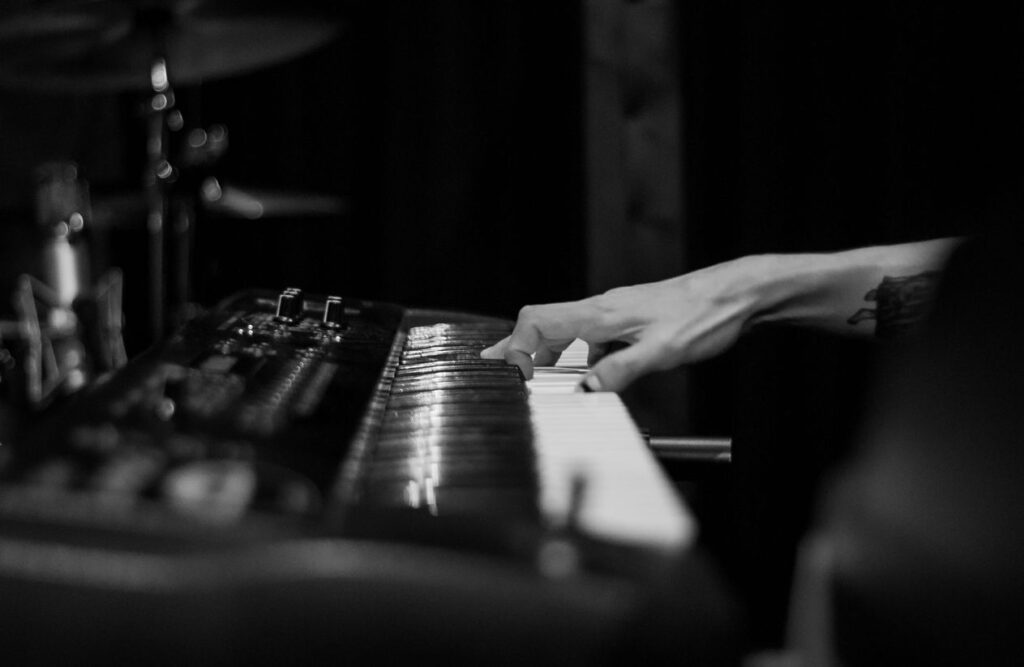The bride’s eyes welled up as the first notes of “Canon in D” filled the church. It wasn’t just the beautiful dress or the heartfelt vows; it was the live piano music that truly elevated the moment, creating an atmosphere of pure magic.
Live music has an undeniable power to transform any event, and choosing the right musician is crucial. This article will guide you through the process of how to book a pianist for weddings, corporate events, or private parties.
Whether you’re planning a romantic wedding ceremony, a sophisticated corporate gathering, or an intimate private party, finding the perfect pianist can make all the difference.
We’ll cover everything you need to know, from defining your needs to finalizing the booking, with a special focus on how to book a pianist for weddings, ensuring your special day is truly unforgettable.
Key Takeaways:
- Define Your Needs: Before searching, determine the type of event, budget, musical style, date, time, location, and equipment requirements.
- Explore Finding Options: Utilize online directories, referrals, social media, live performances, and auditions to find potential pianists.
- Formalize the Booking: Always use a written contract outlining payment terms, performance details, cancellation policies, and other essential information.
- Wedding-Specific Considerations: Plan ceremony music (processional, recessional), cocktail hour and reception music, and coordinate with other vendors.
- Preparation is Key: Provide the pianist with event details, guest information, special requests, and on-site coordination.
- Appreciate the Musician: Consider tipping for exceptional service.
- Live Music Matters: A skilled pianist enhances any event, creating a memorable experience for you and your guests.
Defining Your Needs (Before You Start Searching)

Before diving into the search for your perfect pianist, it’s crucial to define your needs clearly. This groundwork will save you time and ensure you find the ideal musician for your event.
Type of Event: The type of event significantly influences the musical style and atmosphere you’ll want to create.
A wedding ceremony often calls for elegant classical pieces or romantic melodies, while a corporate event might benefit from sophisticated jazz or contemporary background music.
A private party could be more versatile, perhaps featuring a mix of pop, show tunes, or even personalized requests. Consider the overall tone you want to set for your event.
Budget: Setting a realistic budget early on is essential. Pianist pricing varies based on several factors: experience and reputation, the length of the performance, any special requests, and whether they need to provide their own equipment.
Be transparent about your budget when contacting pianists to avoid any surprises.
Musical Style: Piano music spans a wide range of genres. Classical music (think Bach, Mozart, Beethoven) is often chosen for weddings and formal events. Jazz (smooth jazz, swing, bebop) adds a touch of sophistication to corporate gatherings or cocktail hours.
Pop and contemporary music can bring a modern and lively feel to private parties or wedding receptions. Consider what kind of music will best resonate with your guests and create the desired ambiance.
For example, a wedding ceremony might feature Pachelbel’s “Canon in D” for the processional, while a corporate event could have a pianist playing light jazz standards.
Date, Time, and Location: These details are fundamental. Have the date, time, and location of your event finalized before you start contacting pianists.
These are the first questions they’ll ask, and without this information, they won’t be able to provide accurate quotes or check their availability.
Equipment Needs: Does your venue have a piano? If not, the pianist will need to provide their own, which may affect the price.
Also, consider sound equipment. Will the pianist need a microphone, amplifier, or speakers? Clarify these details beforehand to ensure a smooth setup and performance.
Also check our article: How to Hire Dancers for Weddings, Galas, and Corporate Events
Finding the Right Pianist

Now that you’ve defined your needs, it’s time to embark on the search for your perfect pianist. Here are several effective ways to find talented musicians:
Online Directories and Platforms: Several websites and online platforms specialize in connecting musicians with clients.
Websites like AGNT, local musician association websites, and even freelance platforms can be excellent resources. These platforms often allow you to filter your search by location, genre, and event type, making it easier to find pianists who specialize in weddings or other events.
Referrals and Recommendations: Don’t underestimate the power of word-of-mouth. Ask friends, family, colleagues, event planners, or venue staff if they have any recommendations for pianists they’ve worked with or seen perform. Personal referrals can often lead you to hidden gems.
Social Media: Social media platforms can be a valuable tool for finding and researching pianists. Many musicians maintain professional profiles on these platforms, showcasing their work through videos, photos, and testimonials.
Searching for local musicians or wedding vendors on social media can help you discover talented pianists in your area.
Live Performances: Whenever possible, try to see pianists perform live before booking them. Attend local concerts, open mic nights, or other events where musicians showcase their talents.
Seeing a pianist perform in person will give you a much better sense of their musical style, stage presence, and overall professionalism.
Auditions (if applicable): For larger or more critical events, such as a wedding, consider requesting an audition. This will allow you to hear the pianist play specific pieces you have in mind and ensure that their style and skill level are a good match for your event.
While not always feasible, an audition can provide valuable peace of mind.
The Booking Process

Once you’ve found a pianist you like, it’s time to move forward with the booking process. This section outlines the essential steps to ensure a smooth and professional experience.
Initial Contact: When contacting pianists for a wedding or other event, be clear and concise in your initial inquiry. Provide the following information:
- Date, time, and location of the event
- Type of event (wedding, corporate event, private party)
- Desired musical style or genre
- Approximate length of performance
- Your budget (if you’re comfortable sharing it)
- Any specific requests or requirements
This will allow the pianist to quickly assess their availability and provide you with an accurate quote.
Contracts and Agreements: Never skip this crucial step. A written contract is essential for protecting both you and the pianist. The contract should clearly outline all the details of the agreement, including:
- Date, time, and location of the performance
- Performance fee and payment schedule
- Length of performance and any breaks
- Cancellation policy for both parties
- Equipment requirements (piano, sound system, etc.)
- Any special requests or instructions
Review the contract carefully before signing and ensure that you understand all the terms and conditions.
Payment Terms: Typical payment structures often involve a deposit to secure the booking, followed by the final payment closer to the event date.
Discuss payment methods with the pianist. Common methods include check, electronic transfer, or sometimes even cash. Be clear about the payment schedule to avoid any misunderstandings.
Communication and Coordination: Clear and consistent communication is key to a successful performance. Stay in touch with the pianist leading up to the event to confirm details, discuss any changes, and answer any questions they may have.
Provide them with any necessary information about the venue, event schedule, and your preferences. Good communication will help ensure that everything runs smoothly on the day of your wedding or other special occasion.
If you want an easier way to book a pianist, try our service on AGNT, we provide automatic contract and invoicing.
Our app will help me find talents easier and faster, we will also provide some recommendations to ensure that you will get the best talents for your event.
All you need to do is download our app, create a free account, choose the talents you prefer, and we’ll handle the rest.
Special Considerations for Weddings

Weddings often require special attention when it comes to music. Here are some specific considerations for booking a pianist for your big day:
Ceremony Music: The music played during the wedding ceremony sets the tone for the entire event. Careful selection of processional, recessional, and other ceremony music is essential.
- Processional: This is the music played as the wedding party enters. Popular choices include Pachelbel’s “Canon in D,” Wagner’s “Bridal Chorus” (Here Comes the Bride), and various classical pieces. Many couples also opt for contemporary songs or instrumental versions of their favorite tunes.
- Recessional: The recessional is the music played as the newlyweds exit the ceremony. This music should be joyful and celebratory. Popular options include Mendelssohn’s “Wedding March,” Handel’s “Hornpipe,” or upbeat contemporary songs.
- Other Ceremony Moments: You may also want music for other moments during the ceremony, such as the lighting of the unity candle or the exchange of rings. Discuss these options with your pianist.
Cocktail Hour and Reception Music: After the ceremony, the music shifts to a more relaxed and celebratory vibe.
- Cocktail Hour: During the cocktail hour, you might consider light jazz, instrumental pop, or acoustic versions of popular songs. The music should create a pleasant atmosphere for conversation and mingling.
- Reception: The reception is where the party really gets started. Many couples choose a mix of genres for the reception, including pop, R&B, dance music, and classic hits. You can work with your pianist to create a playlist that reflects your musical tastes and will keep your guests dancing all night.
Working with Other Vendors: If you’re hiring other musicians or a DJ for your wedding, it’s essential that they coordinate with the pianist.
They should discuss equipment setup, sound levels, and transitions between performances to ensure a seamless musical experience.
The pianist may also need to coordinate with the photographer or videographer to ensure that key moments are captured without any musical interruptions.
Tips for a Successful Performance

To ensure a truly memorable experience, careful planning and communication with your chosen pianist are essential. Here are some tips for a successful performance, especially when considering how to book a pianist for weddings:
Providing the Pianist with Information: The more information you provide to the pianist, the better they can tailor their performance to your event. Share details about:
- Event Details: Date, time, and location, as well as the overall flow of the event.
- Guest Demographics: A general idea of your guests’ age range and musical preferences can help the pianist choose appropriate music.
- Special Requests: Do you have any specific songs you’d like the pianist to play (or not play)? Are there any particular announcements or moments during the event that require specific musical cues? Communicate these requests clearly.
- Logistics: Provide information about parking, venue access, and any other logistical considerations that might affect the pianist’s setup or performance.
On-Site Coordination: On the day of the event, ensure that someone is available to coordinate with the pianist. This person can:
- Show the pianist where to set up and ensure they have everything they need.
- Introduce the pianist to any other vendors they need to work with.
- Act as a point of contact for any last-minute questions or requests.
Gratuity: While not always expected, tipping is a thoughtful way to show your appreciation for the pianist’s talent and hard work. A standard gratuity for musicians is typically 15-20% of the performance fee.
You can adjust this based on the quality of the performance and any extra services the pianist provided. It’s always best to offer the gratuity discreetly at the end of the event.
Also read our article“How to Hire the Perfect Band or Musician for Your Wedding”
Conclusion
Booking a pianist for weddings, corporate events, or private parties involves several key steps: defining your needs, finding the right musician, navigating the booking process, and considering special requirements for specific events like weddings.
Remember to clearly communicate your preferences and expectations to ensure a successful performance. Live piano music adds an unparalleled touch of elegance and sophistication, creating a truly memorable atmosphere for any occasion.
Whether it’s the touching melody of a wedding ceremony, the sophisticated ambiance of a corporate gathering, or the lively entertainment at a private party, a skilled pianist can elevate your event to the next level.
So, if you’re looking to create an unforgettable experience, start planning your event’s music today! Begin your search for the perfect pianist and let the power of live music transform your special day.
Since you’re looking for a pianist, check the list below for our recommended pianist that you can book or hire for the wedding:






